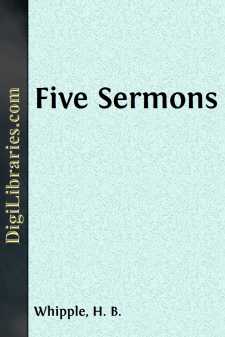Categories
- Antiques & Collectibles 13
- Architecture 36
- Art 48
- Bibles 22
- Biography & Autobiography 813
- Body, Mind & Spirit 142
- Business & Economics 28
- Children's Books 14
- Children's Fiction 11
- Computers 4
- Cooking 94
- Crafts & Hobbies 4
- Drama 346
- Education 46
- Family & Relationships 57
- Fiction 11829
- Games 19
- Gardening 17
- Health & Fitness 34
- History 1377
- House & Home 1
- Humor 147
- Juvenile Fiction 1873
- Juvenile Nonfiction 202
- Language Arts & Disciplines 88
- Law 16
- Literary Collections 686
- Literary Criticism 179
- Mathematics 13
- Medical 41
- Music 40
- Nature 179
- Non-Classifiable 1768
- Performing Arts 7
- Periodicals 1453
- Philosophy 64
- Photography 2
- Poetry 896
- Political Science 203
- Psychology 42
- Reference 154
- Religion 513
- Science 126
- Self-Help 84
- Social Science 81
- Sports & Recreation 34
- Study Aids 3
- Technology & Engineering 59
- Transportation 23
- Travel 463
- True Crime 29
Five Sermons
by: H. B. Whipple
Description:
Excerpt
I. SERMON AT THE OPENING SERVICES OF THE GENERAL CONVENTION, OCTOBER 2, 1889.
"We have heard with our ears, O God, our fathers have told us, what work Thou didst their days, in the times of old."—PSALM xliv. I.
Brethren: I shall take it for granted that there is a visible Church; that it was founded by Our Lord Jesus Christ, and has His promise that the gates of hell shall never prevail against it. We believe that ours is a pure branch of the apostolic Church; that it has a threefold ministry; that its two sacraments—Baptism and the Supper of the Lord—are of perpetual obligation, and are divine channels of grace; that the faith once delivered to the saints is contained in the Catholic creeds, and has the warrant of Holy Scripture which was written by inspiration of God. On this centennial day I shall speak of the history and mission of this branch of the Church of our Lord Jesus Christ.
It was a singular providence that this continent, laden with the bounty of God, was unoccupied by civilization for thousands of years. America was discovered by a devout son of the Latin Church, whose name— Christopher, Christ-bearer, and Columbus, the dove—ought to have been the prophecy that he would bear the Gospel to the New World. It was at a time when Savonarola, with the zeal of a prophet of God and the eloquence of a Chrysostom, was laboring to awaken the Church to a new life. No nation ever had a nobler mission than Spain. That mission was forfeited by unholy greed and untold cruelty. It was lost forever. Other nations claimed the continent for their own. In the providence of God; this last of the nations was founded by the English-speaking race. I reverently believe that it was because they recognize as no other people the two truths which underlie the possibility of constitutional government, i.e., the inalienable rights of the individual citizen, and loyalty to government as a delegated trust from God, who alone has the right to govern. These lessons are intertwined with two thousand years of history. They reach back to the days when the savage Briton came in contact with Roman civilization and Roman law, and have been deepened by centuries of Christian influences which have changed our savage fathers into truth-speaking, liberty-loving Christian men.
More marvellous are the providences intertwined with the history of the Church. It was planted by apostolic men, and numbered heroes like St. Patrick and St. Alban before the missionary Augustine came to Canterbury. Through all of its history it has been the Church of the English-speaking race. The liturgy contains the purest English of any book, except the English Bible, which was translated by her sons. The ritual which Augustine found in England came from the East; and the liturgy which he introduced was, by the advice of Gregory, taken from many national Churches. The Venerable Hooker said: "Our liturgy was must be acknowledged as the singular work of the providence of God." In its services it represents the Church of the English-speaking race. The exhortation to pray for the child to be baptized, the direction to put pure water into the font at each baptism, the sign of the cross, the words of the reception of the baptized, the joining of hands in holy matrimony, the "dust to dust" of the burial,—are peculiar to the offices of the English-speaking people....


